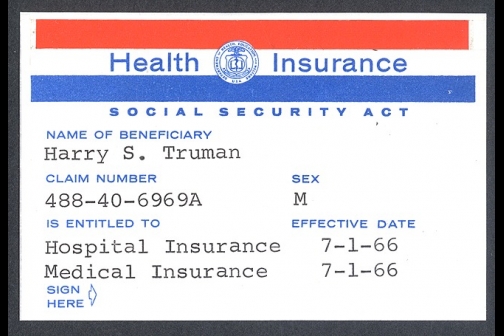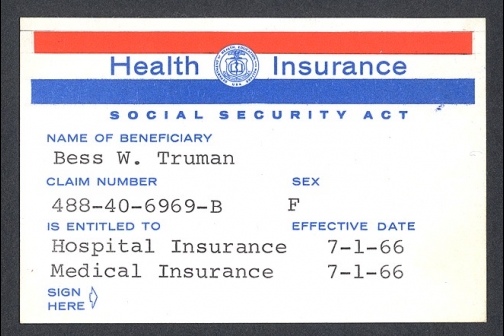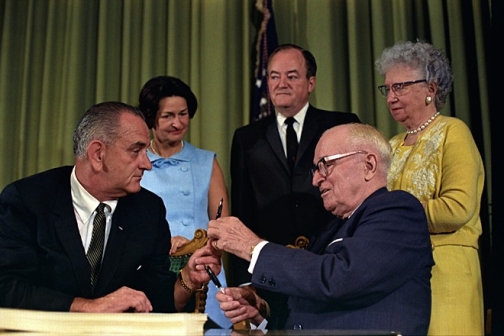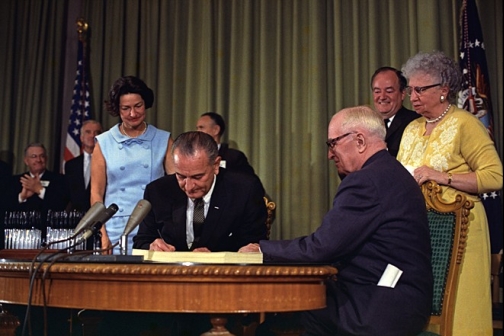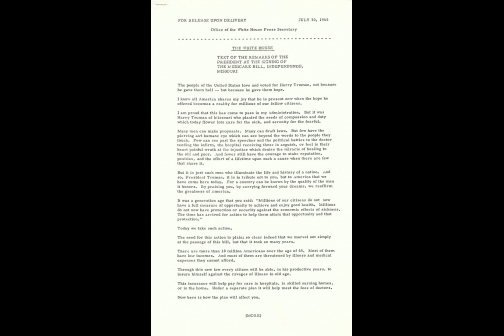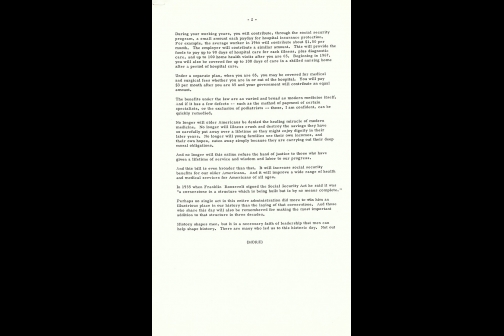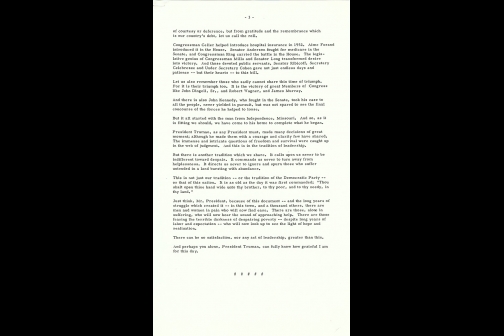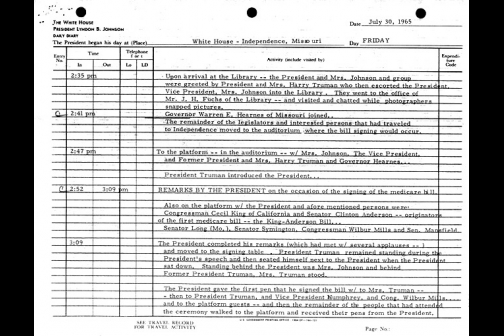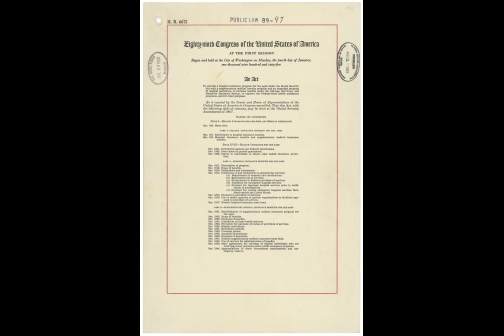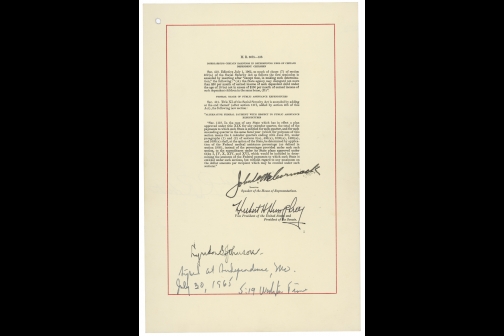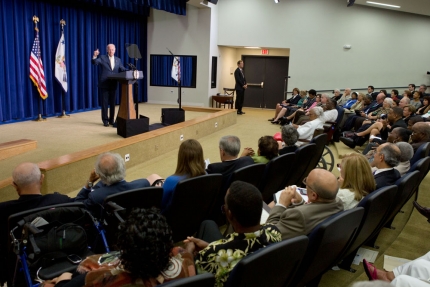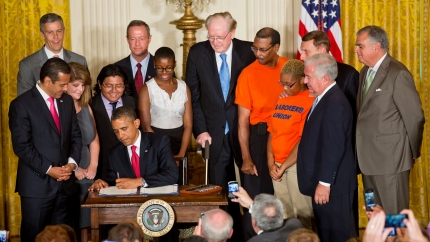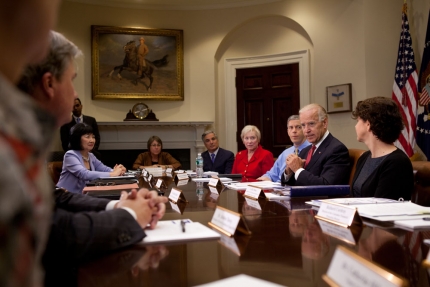Protecting the Middle Class News
Annual Census Data on Income, Poverty, and Health Insurance for 2011
Posted by on September 12, 2012 at 12:34 PM EDTToday’s report shows that while we have made progress digging our way out of the worst economic crisis since the Great Depression, too many families are still struggling and Congress must act on the policies President Obama has put forward to strengthen the middle class and those trying to get into it.
Real median income declined by $777 to $50,054 in 2011. This decline in income is another example of why it was so important for Congress to pass the President’s payroll tax cut - which put $1,000 in the pocket of approximately 160 million working Americans last year, thus providing an important cushion for families that saw their pre-tax incomes decrease in 2011. More recent data available for 2012, including data on job growth, unemployment and wages, indicate that real median income is growing this year. In addition, data from the government’s Current Population Survey analyzed by Sentier Research indicate that median household income has grown $1,176 in the last 12 months; although these data are not as reliable as the comprehensive Census estimates, they are an indicator of more recent trends in income.
Still, too many Americans are feeling the effects of the crisis, which is why the President believes Congress must vote this month to extend the middle class tax cuts to ensure that 98 percent of Americans do not see a significant tax hike at the end of the year. If Congress fails to act, the typical middle class family will face a $2,200 tax increase. Middle class families need economic certainty and Republicans in Congress should not hold these middle class tax cuts hostage simply to preserve massive tax breaks for millionaires and billionaires. Moreover, if Congress is truly concerned about income levels, it should act this month to pass job creation proposals in the President’s American Jobs Act – which independent economists believe would create 1 million jobs and has been before Congress for over a year.
Today’s report also shows that thanks in part to the Affordable Care Act, 1.3 million fewer people were uninsured in 2011. Today’s report also shows that thanks in part to the Affordable Care Act, 3.6 million more people were covered by health insurance in 2011 and the percentage of the population without insurance declined from 16.3 percent in 2010 to 15.7 percent in 2011. In addition, the rate of private insurance coverage was essentially unchanged in 2011 for the first time in a decade.
Learn more about , EconomyThe Health Care Law is Saving Americans Money
Posted by on September 11, 2012 at 12:18 PM EDTEd. note: This is cross-posted from Healthcare.gov.
The Affordable Care Act holds insurance companies accountable and puts more money back into the pockets of Americans across the country. According to a new report, consumers saved over $2 billion because of new rules that protect people from insurance industry abuses.
As a former Insurance Commissioner, I’m familiar with how alone consumers can feel when dealing with their insurance companies. Under the health care law, insurers are finally being held accountable to their policyholders. For the first time ever, new rate review rules in the health care law prevent insurance companies in all states from raising rates with no accountability or transparency. Forty-five states and the District of Columbia have received $160 million in grants to increase their oversight of premium hikes.
Some states, like Nevada, are using the funds to better educate consumers about the resources available to them. Others – like Mississippi and South Dakota – have used the money to add new consumer protections. In these states, officials can not only review rate hikes, but can also reject those hikes that are not justified.
Learn more about Health CarePresident Obama Continues the Push for Middle Class Tax Cuts
Posted by on August 3, 2012 at 3:38 PM EDT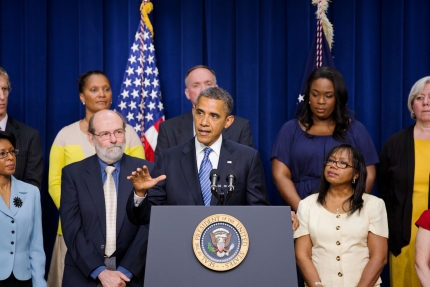
President Barack Obama delivers remarks on extending tax cuts for the middle class, in the Eisenhower Executive Office Building, South Court Auditorium, Aug. 3, 2012. (Official White House Photo by Sonya N. Hebert)
Unless the the House of Representatives takes action before January 1, a typical middle-class family of four will see their taxes go up by $2,200 in the coming year.
President Obama is fighting to prevent that from happening, and today, he again pushed lawmakers to get this done.
"What we should do right now is give middle-class families and small business owners a guarantee that their taxes will not go up next year," he said. "When families have the security of knowing that their taxes won’t go up they’re more likely to spend, and more likely to grow the economy. When small business owners have certainty on taxes and can plan ahead they’re more likely to hire and create new jobs. And that benefits all of us."
Getting Women the Care They Need
Posted by on August 1, 2012 at 2:04 PM EDTAs chair of the White House Council on Women and Girls, I am incredibly proud to highlight an important part of the health care law that gives women more control over their health care. Thanks to the Affordable Care Act, 47 million women will have access to the preventive services they need. We all know that women and men face unique health risks and benefit from different preventive services. For too long, too many women have gone without these services due to out-of-pocket costs or lack of coverage.
Under the Affordable Care Act, for the first time ever, women will now have access to life-saving preventive care, such as mammograms and contraception, without paying any more out of their own pockets.
Learn more about Health Care, WomenFrom the Archives: The Medicare Bill of 1965
Posted by on July 30, 2012 at 12:28 PM EDTOn July 30, 1965, President Lyndon B. Johnson signed into law the Social Security Act Amendments, popularly known as the Medicare bill. It established Medicare, a health insurance program for the elderly, and Medicaid, a health insurance program for the poor.
Former President Truman participated in the signing ceremony with President Johnson. Harry S. Truman and Bess Truman received Medicare registration cards numbers one and two. At the time, Mr. Truman was 81 years old, and he described it as a “profound personal experience for me.”
The National Archives have put together a gallery featuring images and artifacts from the event in Independence, Missouri 47 years ago today. Check it out:
Learn more about the Medicare bill: http://www.ourdocuments.gov/doc.php?flash=true&doc=99
Learn more about Health Care, Additional IssuesNew “Shopping Sheet” Will Make It Easier for Students to “Know Before They Owe”
Posted by on July 24, 2012 at 1:55 PM EDTEditor’s Note: You can read more about the Shopping Sheet in a post on the official blog of U.S. Department of Education.
Almost every day, President Obama gets letters from students who are swimming in student loan debt, and every week it seems we see another newspaper article about how the cost of college is becoming prohibitively expensive for too many American families.
We know that college remains an excellent investment. Increasingly however, it is a financed investment, with the monthly loan payments to prove it. And, while we don’t want would-be students to be scared away from going to college because of the price, we aren’t doing students any favors by obscuring the reality of this commitment until after they’ve graduated.
While this Administration continues to do everything we can to make sure that college remains affordable and available to families in the middle class and those aspiring to the middle class, we also are focused on making it easier for families to understand the costs and benefits of higher education up-front, so that they can more easily choose a college that is both high-quality and affordable.
An American Renaissance in Manufacturing Happening In Kansas City and Columbia, Missouri
Posted by on July 23, 2012 at 6:53 PM EDTEd note: this post was originally published on The Commerce Blog, the official blog of the U.S. Department of Commerce
I am back in my home state of Missouri today, so it is even more of a treat to witness firsthand the resurgence in American manufacturing. I visited two manufacturers today – the A. ZAHNER Company, in Kansas City, and Environmental Dynamics International (EDI), in Columbia – and had the chance to talk to some remarkable local businesses leaders and entrepreneurs in both cities.
Under President Obama’s leadership, and with the hard work of businesses and workers like those here in Missouri, our private sector has now seen 28 straight months of job growth – 4.4 million jobs. Of course, there is more work to be done, but we are making progress in critical areas. Over the last two and a half years, we’ve seen the strongest growth in manufacturing jobs since the 1990s. Missouri alone has gained nearly 9,000 new manufacturing jobs since 2010.
On top of that, manufacturers in states like Missouri are realizing that investing here at home is both the right thing to do and the smart thing to do. Many businesses – both here and abroad – are deciding to keep jobs here, bring jobs back to the U.S., or to set up operations here for the first time—a trend called “insourcing.”
We need to do everything possible to support businesses in places like Missouri that are thinking about insourcing. The Obama Administration will continue to call on Congress to pass legislation to give our companies a tax break if they move operations and jobs back.
Learn more about Economy,Wall Street Reform Two-Years Later: Reforming the System and Protecting American Consumers
Posted by on July 21, 2012 at 3:06 PM EDTIt’s now been almost four years since irresponsibility in certain corners of Wall Street nearly caused our entire economy to collapse. Today, it’s pretty clear to most of us that the rules we once had in place to protect our financial system were old and poorly enforced. They allowed dangerous risk-taking to go unchecked. And when the largest financial institutions did fail, they left hardworking taxpayers holding the bag. And as we dug our way out of the worst recession of our lives, President Obama promised to reform the system so this never happened again.
That’s why, two years ago today, President Obama signed into law Wall Street reform that put in place smarter, tougher, commonsense rules of the road and the strongest consumer protections in history. For example, if you’re a big bank or financial institution, you now have to hold more cash on hand so that if you make a bad decision, you pay for it, not the taxpayers. You’re no longer going to be able to make risky bets with your customers’ deposits. And the new law creates new authorities to claw back outsized compensation from failed CEOs, while finally giving shareholders a say on executive salaries.
We continue to make steady progress on these fronts. Just this month, nine of the largest banks submitted “living wills” that details how they’ll pay for things if they end up failing. These wills will complement the new authorities we’ve put in place that allow regulators to break up and wind down large firms so taxpayers are never again left on the hook for banks’ failures. In June, regulators approved final rules that will force banks to hold more cash on hand for their trading activities and any potential losses.
But Wall Street reform isn’t just about reigning in Wall Street excess. It’s also about protecting Main Street families. For the first time in our history, we now have an independent consumer watchdog with one job: to look out for you. That means making sure you’ve got all the information you need to make important financial decisions. And it means going after anyone – from mortgage brokers to payday lenders to debt collectors – who deals with you dishonestly.
Just this week, that consumer watchdog put in place rules to supervise credit bureaus. This marks the first time in history that these companies will be subject to federal supervision. And working together with other regulators, they ordered Capital One Bank to refund $150 million dollars directly to 2 million customers who were deceived or misled into buying things they didn’t understand or didn’t even want.
The consumer watchdog has also set up a toll free number you can call to make sure you’re getting a fair deal on your mortgage – and to hold banks accountable if you’re not. You can reach them at (855) 411-2372.They recently put together a new mortgage disclosure form that spells out – in simple terms – how much you’re going to owe on your home. No more hiding things in fine print.
And they’ve set up a new website that makes it easier than ever for you to report on a whole range of financial abuse. If you’re applying for a credit card, opening a bank account, or trying to get a student loan and something doesn’t seem right, go to www.consumerfinance.gov/complaints and let them know. Not only will they bring your complaint directly to the company in question, they’ll give you a tracking number so that you can check back and see exactly what’s being done on your behalf.
That’s what Wall Street reform is all about – looking out for hardworking Americans by making sure everyone plays by the same rules. We’ve come too far to go back to an era of top-down, on-your-own economics. Now is the time to move forward; to strengthen the middle class; and to rebuild an economy where everyone can have the confidence that if they work hard, they can get ahead.Learn more about the Dodd-Frank Wall Street Reform and Consumer Protection Act.
Learn more aboutReforming Wall Street, Protecting Main Street: An Update on Wall Street Reform
Posted by on July 19, 2012 at 3:40 PM EDTEd. note: This is cross-posted from Treasury Notes
Two years ago this week, President Obama signed the Dodd-Frank Wall Street Reform and Consumer Protection Act -- the most significant set of financial reforms since the Great Depression. The landmark law is designed to help protect Americans from the excessive risk, fragmented oversight, and poor consumer protections that played leading roles in bringing about the recent financial crisis.
Treasury and the independent regulators have made meaningful progress implementing the law, which is vital to restoring trust in the underlying safety, stability, and integrity of the financial system, and to rebuilding a pro-growth, pro-investment environment. To outline the progress made, the U.S. Department of the Treasury has developed an overview of where reform stands and the changes it has effected on the financial system to date. For a copy of the overview, please click here.
Learn more aboutSo How Many Consumer Reporting Companies Are There?
Posted by on July 17, 2012 at 4:57 PM EDTEd note: The Consumer Financial Protection Bureau (CFPB) announced yesterday that they adopted a rule to begin supervising larger consumer reporting agencies, which include what are popularly called credit bureaus or credit reporting companies. This is the first time these companies will be supervised at the federal level. This blog post, originally published on the CFPB blog, explains what this will mean for consumers.
You may know about the three biggest nationwide credit reporting companies: Experian, Equifax, and TransUnion. But did you know that there are other companies out there that may be providing reports on you that could be used to decide if you’re eligible for consumer financial, insurance, medical and other products?
Today the CFPB is posting a list of consumer reporting companies – companies that collect information and write reports that could be used to decide if you will be able to get credit, insurance, or a job. This list doesn’t cover every company in the industry. It’s a list of companies that have identified themselves as consumer reporting companies or provide consumers access to their consumer reports. (1) The list includes both the biggest nationwide credit reporting companies and a longer list of “specialty reporting companies.”
Specialty reporting companies focus on certain industries. Just like the three biggest nationwide credit reporting companies, specialty reporting companies collect and share information with creditors and other businesses. There are a lot of these companies on the list, so we’re also trying to give tips on which of them may be important to you. The list also has information about how you can get copies of your reports (see below).
Learn more about Economy,Vice President Biden Speaks To Seniors About Retirement Security
Posted by on July 16, 2012 at 6:52 PM EDTToday, the Vice President spoke to more than 100 community leaders from across the country representing over 60 seniors groups that are part of the Leadership Council of Aging Organizations. He told the audience that when it comes to Social Security and Medicare, “the question is what are we going to do to strengthen and sustain these programs now and for the future.” In contrast, Congressional Republicans are trying to weaken or dismantle these programs.
Last year, Congressman Paul Ryan proposed to end traditional Medicare. His plan, which was embraced by his Republican colleagues, would give seniors a voucher to buy private insurance and hold them responsible for any costs that exceed the value of the voucher. As a result, the typical 65-year-old’s out-of-pocket health care costs would double over time. While Congressman Ryan introduced a revised plan this year, it still relies on a voucher system that would increase the financial burden on seniors.
President Obama and Vice President Biden want to strengthen Medicare and secure the program for the future. Our health care law extends the life of Medicare by eight years by taking smart steps like cutting waste and fraud and creating incentives to cut down on hospital readmissions. These steps will save seniors in traditional Medicare an average of $160 on premiums and copays in 2012 alone. In addition, the law has already saved 5.3 million seniors an average of $600 on prescription drugs by closing the “donut hole,” and has ensured that over 30 million have access to free preventive services like cancer screenings and annual wellness visits.
Ask an Expert: How Are We Helping Underwater Borrowers?
Posted by on July 10, 2012 at 3:32 PM EDTOn Thursday, Secretary of Housing and Urban Development Shaun Donovan will sit down for a discussion with homeowners from across the country about President Obama's refinancing plan.
We're helping to kick off the conversation with a series of videos in which the Housing Secretary answers some of the most popular questions we've received about the plan.
Today, he tells us how the government is helping homeowners who owe more than the value of their mortgages.
Check it out and be sure to tune in Thursday at 3:15 PM ET. Watch Shaun Donovan, U.S. Secretary for Housing and Urban Development, answer questions here.
Learn more about Economy,President Obama Signs Bill to Create Jobs, Restore America's Transportation System
Posted by on July 9, 2012 at 2:29 PM EDTEd. Note: This is a cross-post from Fast Lane, Secretary of Transportation Ray LaHood's official blog
Last Friday afternoon, President Obama signed legislation that will put thousands of construction workers on job sites across the country and supports our commitment to restoring America's infrastructure.
This transportation bill, Moving Ahead for Progress in the 21st Century (MAP-21), will sustain our Highway Trust Fund and provide states and communities with two years of steady funding to build needed roads, bridges, and transit systems. It also builds on DOT's efforts to improve safety across all forms of transportation and to make progress on transportation alternatives as we have done during the last three years.
Learn more about EconomyLandmark Court Decision Upholds EPA's Actions to Protect Families
Posted by on June 29, 2012 at 3:48 PM EDTEarlier this week, the United States Court of Appeals for the D.C. Circuit affirmed – via a unanimous ruling – several important steps taken by the Environmental Protection Agency (EPA) to protect the health of American families, save consumers money at the pump, and reduce our dependence on foreign oil.
This was a landmark decision with several key components:
- The Court upheld EPA’s science-based finding that carbon pollution endangers the public’s health and welfare, noting the “substantial record evidence.”
- The Court protected the Administration’s historic fuel economy standards for cars and trucks, adding that EPA’s implementation of the Clean Air Act was “unambiguously correct.”
- Finally, the Court dismissed several petitions challenging a requirement for some of the nation’s largest polluters – starting with new power plants – to install widely-available and cost-effective pollution control technology, while shielding smaller emitters, arguing that “no petitioner had standing.”
Learn more about Economy, Energy and EnvironmentPeace of Mind in Knowing Sick Child Won’t be Denied Health Coverage
Posted by on June 20, 2012 at 2:26 PM EDTEd. Note: This was originally published on Healthcare.gov
Watch Alycia and Avey's story here:
As Alycia Steinberg of Towson, MD, tells us, when a child is seriously ill, a parent shouldn’t have to worry that an insurer would deny coverage due to the child’s pre-existing condition.
That is why she’s grateful that the Affordable Care Act protects her daughter Avey’s health insurance coverage because it bars insurance companies from denying coverage to children based on pre-existing conditions. “To have a child with cancer, there is so much to worry about, but the Affordable Care Act means that I don’t have to worry that Avey will be denied treatment because of her pre-existing condition,” Alycia says.
Learn more about , Economy, Health CareAffordable Care Act Helps Improve Access to High Quality, Coordinated Care
Posted by on June 20, 2012 at 10:33 AM EDTToday, HHS announced that 219 community health centers received another $128.6 million to help them expand their reach, supporting approximately 5,460 jobs and serve 1.25 million additional patients.
Today’s announcement is one in a series of efforts to make our community health centers stronger. Since the passage of the Affordable Care Act, community health centers around the country have received new resources to expand capacity and improve care for their patients.
At the Erie Family Health Center in Chicago, these new resources are helping staff better monitor patients’ care, follow up with patients and ensure they get the care they need that can stop health problems before they start. For example:
One of the health center’s patients is a 52 year old man with diabetes. At his last appointment, his diabetes numbers were clearly trending in the wrong direction. When he missed his follow-up appointment, the health center knew and was able to reach out to him because of its computer systems reminds the staff to contact patients who have missed appointments or who have lab results showing poorly controlled diabetes.
Learn more about Economy, Health CareKiersten-Care: Using the Health Care Tax Credit to Take Care of Employees
Posted by on June 19, 2012 at 4:25 PM EDTEd. Note: This was originally published on Healthcare.gov
Kiersten Firquain founded Bistro Kids in Kansas City, KS, seven years ago to provide locally sourced organic “kid-friendly” food to as many students as possible. While her chefs were cooking up healthy food for youngsters, she wanted to do something for her employees’ health. The health care law tax credit for small businesses, she says, made it possible to offer them health insurance.
“We talked to our chefs and employees and asked, ‘What’s something you would like from Bistro Kids?’ And one of the things that kept coming up was insurance,” Kiersten says.
Bistro Kids qualified for about $1,500 per year in tax credits under the health care law, the Affordable Care Act, which made a huge difference to a small business like hers. For one of her chefs, Kiersten says, health insurance means a $5 co-pay for a prescription instead of a $250 cost, which her chef would not have been able to afford.
Learn more about Economy, Health CareWhy Refi? Your Questions Answered.
Posted by on June 19, 2012 at 11:27 AM EDTOver the past few weeks we’ve been telling you about President Obama’s plan to cut through the red tape that’s been preventing many homeowners from refinancing their mortgages and saving hundreds of dollars each month. We’ve been soliciting your feedback and asking you to raise your voice in support, and so far your response has been overwhelming. Since then more than 50,000 Americans have joined the conversation about this important issue.
Many of you had questions about the plan and how it would impact you and your community, so we asked Jim Parrott, Senior Advisor for Housing at the National Economic Council to record a few video responses below.
Still have questions? Later this week, U.S. Department of Housing and Urban Development Secretary Donovan will be answering via video response. You can ask us @WhiteHouse using the hashtag #WhyRefi, on our Facebook wall, on our Google+ page or on this webform on Whitehouse.gov.
Have all the information you need? Visit Whitehouse.gov/why-refi to tell President Obama you support his plan.
Learn more about Economy, ,Reforming Unemployment Insurance to Protect Jobs and Incomes for American Workers
Posted by on June 18, 2012 at 1:45 PM EDTIn his inaugural address, President Obama praised workers who “would rather cut their hours than see a friend lose their job.” But in most states, our unemployment insurance (UI) system discourages reducing hours in this way. A worker who is laid off has access to UI benefits that temporarily cover part of lost wages, but a worker whose hours are reduced has no such access, creating an incentive for layoffs while leaving workers who face an involuntary reduction in their hours with no protection or support. Today the Department of Labor is issuing guidance on new legislation that will help to address these problems. This guidance is part of a series of important UI reforms designed to contribute to job creation and job placement that the President proposed in the American Jobs Act, were signed into law in February and are now being implemented.
Programs in some states that allow workers whose hours have been cut to claim pro-rated UI benefits—so-called short-time compensation or work sharing programs—help to keep workers on the job. President Obama has long advocated the expansion of work sharing to help employers and their workers. It’s an idea that has been supported by economists across the political spectrum. The President’s proposal to expand the number of states with work-sharing programs, and increase employer awareness of the benefits of work sharing, was included in both his FY 2012 and 2013 Budgets, and in last September’s American Jobs Act. That proposal was signed into law on a bipartisan basis as part of the February extension of the payroll tax cut, and is being implemented today through guidance released by the Labor Department.
Learn more about EconomyVice President Discusses College Affordability with College and University Officials
Posted by on June 5, 2012 at 6:55 PM EDTToday, Vice President Biden met with the presidents and senior officials of ten colleges, universities, and state systems of higher education from across the country to discuss the importance of providing students and families with transparent information about the cost of attendance and financial aid. Secretary Duncan, Director of the Consumer Financial Protection Bureau Richard Cordray, and Director of the White House Domestic Policy Council Cecilia Muñoz also participated in the discussion.
Post-secondary education is a valuable investment – more than 60 percent of new jobs in the next decade will require a credential beyond a high school diploma. But before settling on a school and signing any loan agreements, students and their families need easy-to-understand information regarding how they will finance their education. Colleges and universities already provide some statistics about the cost of attendance and available financial aid, but that information is often not clearly presented to students and their families in a way that facilitates easy comparison among schools. Further, schools usually do not provide important information including an estimate of students’ future loan payments, or data about the likelihood of graduation or loan default.







